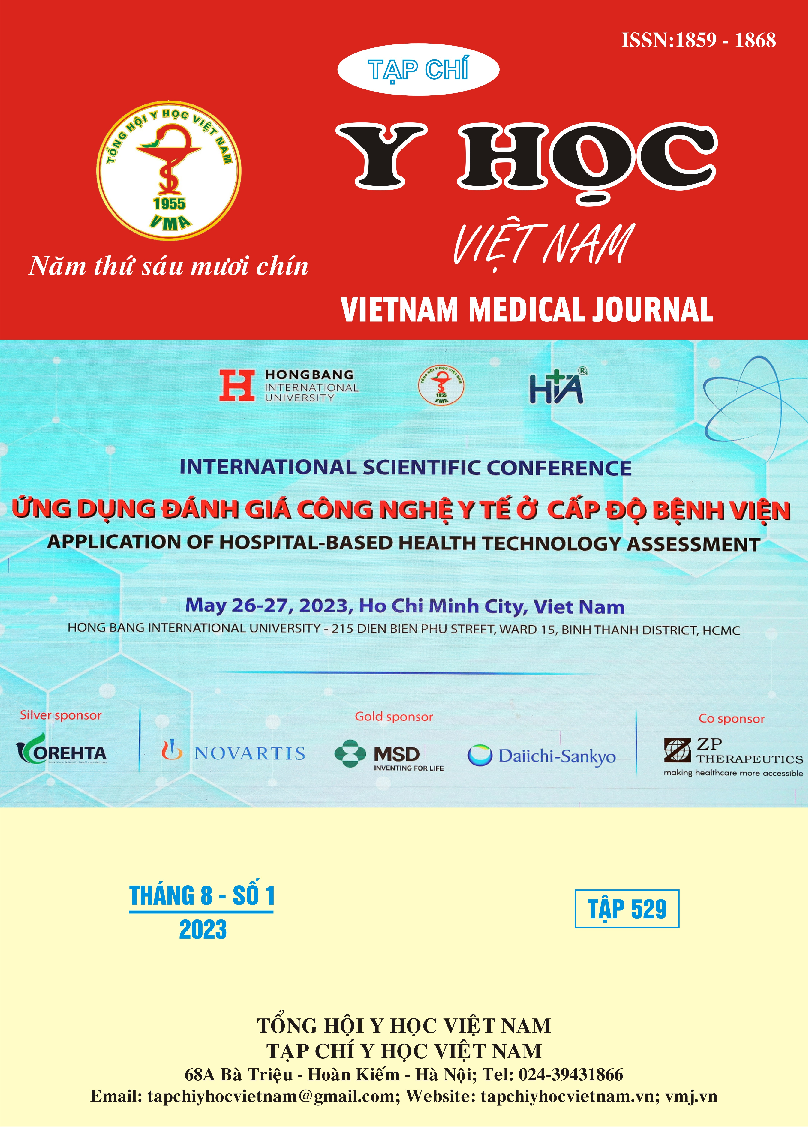PRENATAL DIAGNOSIS OF FETUSES WITH CONGENITAL HEART DISEASE AT TU DU HOSPITAL
Main Article Content
Abstract
Background: Congenital heart disease is the most common class of major congenital defects. Prenatal diagnosis of congenital heart disease can provide the best possible medical care for pregnancy management, prognosis as well as more effective postpartum treatment plan. Objecttive: Our study aimed to investigate chromosomal abnormalities in fetuses with congenital heart disease and to identify the association of risk factors with chromosomal abnormalities. Methods: This was a retrospective study of 396 fetuses with congenital heart disease at Tu Du Hospital from June 2021 to April 2023, data collection by data collection sheet. Results: Our study found a detection rate for numberic chromosomal abnormalities (aneuploidy and mosaicism) of 25% [KTC 95%: 20.71% - 29.28%]in pregnancies (n=99). The detection rate for pathogenic copy number variants (pCNVs) was 9.47% [KTC 95%: 6.07% – 12.87%]. The related factors include: maternal age ≥ 35 years (OR*: 2.01[KTC 95%: 1.23% – 3.28%]), multipara (OR*: 1.89 [KTC95%: 1.16% – 3.09%]), congenital heart disease with extracardiac structural anomalies (OR*: 2.39 [KTC95%: 1.51% – 3.76%]). Conclusion: When congenital heart disease is identified through prenatal screening by ultrasound, patients should be referred for genetic counseling and offered appropriate genetic testing. This can help optimize outcomes and postpartum intervention.
Article Details
Keywords
congenital heart disease, chromosomal abnormalities, copy number variants
References
2. Nhựt Thư Hương Trịnh (2015), Kết cục thai kỳ ở thai nhi có bất thường tim bẩm sinh vùng thân nón động mạch, Đại học Y Dược thành phố Hồ Chí Minh.
3. T. T. Hoang, E. Goldmuntz, A. E. Roberts, et al. (2018), "The Congenital Heart Disease Genetic Network Study: Cohort description", PLoS One, 13(1), pp. e0191319.
4. H. J. Mustafa, K. M. Jacobs, K. M. Tessier, et al. (2020), "Chromosomal microarray analysis in the investigation of prenatally diagnosed congenital heart disease", AJOG, 2(1), pp. 100078.
5. Y. Wang, L. Cao, D. Liang, et al. (2018), "Prenatal chromosomal microarray analysis in fetuses with congenital heart disease: a prospective cohort study", AJOG, 218(2), pp. 244.e241-244.e217.
6. F. Gary Cunningham, Kenneth J. Leveno, Steven L. Bloom, et al. (2018), "Maternal Physiology", Williams Obstetrics, 25e, McGraw-Hill Education, New York, NY.
7. F. Mone, B. K. Stott, S. Hamilton, et al. (2021), "The Diagnostic Yield of Prenatal Genetic Technologies in Congenital Heart Disease: A Prospective Cohort Study", Fetal Diagn. Ther., 48(2), pp. 112-119.
8. Erin Rooney Riggs, Erica F. Andersen, Athena M. Cherry, et al. (2020), "Technical standards for the interpretation and reporting of constitutional copy-number variants: a joint consensus recommendation of the American College of Medical Genetics and Genomics (ACMG) and the Clinical Genome Resource (ClinGen)", Genetics in Medicine, 22(2), pp. 245-257.


